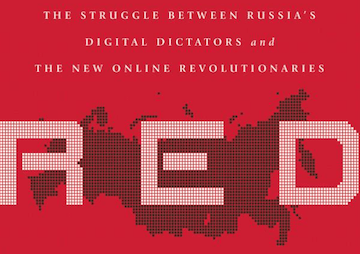Controlling the Internet and Popular Opinion in Russia
A new book shows how technological advancement and a willingness by professionals to cooperate with the state combined to create a “wide-ranging, all-penetrating Internet surveillance and censorship system in Russia." Public Affairs
Public Affairs
Public Affairs
A new book shows how technological advancement and a willingness by professionals to cooperate with the state combined to create a “wide-ranging, all-penetrating Internet surveillance and censorship system in Russia,” writes Masha Gessen at The Intercept.
In “The Red Web,” authors Andrei Soldatov and Irina Borogan write:
To make the system work across the country, the filtering system required a lot of people. … The specialists needed technical training, had to comply with orders, no questions asked, and they had to protect the secrecy of the operations. … Russia had plenty of such specialists.
These “specialists” routinely justify the use of their expertise to help the state construct a machine of repression. The book quotes a Russian engineer who developed speech-recognition technology that is used by a number of regimes as saying: “If governments listen in on people’s conversations, it’s not the microphone’s fault!”
Soldatov and Borogan continue:
“These exact words have been repeated over and over again by engineers who willingly served the Soviet state and then did the same thing in Russia. They believed it was not their fault. When Stalin’s security services in the 1930s and 1940s needed to conduct secret research in particular areas, they arrested scientists and engineers and sent them to special installations, the sharashkas, which were closed off from the outside and heavily guarded. The scientists and engineers were motivated to produce quick results under the threat of being sent to labor camps if they failed. But in the years after Stalin’s death in 1953 this system evolved into a far-reaching system of research institutes, not all of them closed.”
Gessen continues:
In other words, by the 1970s the system had determined the minimum amount of pressure required to turn these people into its willing executioners — and it was minimal indeed. A little bit of privilege, even a decent salary combined with the opportunity to practice one’s trade, was often enough. This knowledge persists to this day, and continues to serve the regime of President Vladimir Putin. Publishers, driven not by the threat of death but by the fear of losing profit, become the state’s equal partners in censoring the printed word. Media owners, fretting over other business interests, lead their own editors and reporters to the slaughterhouse of honesty and creativity.
The main subjects of Soldatov and Borogan’s book, online service providers including ISPs, media outlets, aggregators, mail services and social networks, are constantly angling for a position from which it is safe to conduct business. To do this, they try to guess which way the wind is blowing and make adjustments before they are told to do so. Sometimes, they guess wrong and suffer the consequences. But usually, they guess right and succeed in helping the authorities constrict freedom of speech and information ever further — only to discover that they have to repeat the maneuver again and again, until they squeeze themselves out of existence.
Very rarely do they resist. Soldatov and Borogan describe one man who did. Pavel Durov, the founder and CEO of VKontakte, a Russian social network that has more users there than Facebook, twice resisted the authorities’ demands for user data. Last year, Durov was forced to give up his shares in the company, then his job at the helm, then his home in Russia altogether. Since going into exile he has poured his money and expertise into Telegram, a messaging service whose encryption and self-destruction features are designed to make it impervious to surveillance. Some of Russia’s few remaining anti-Putin activists have gained from Durov’s loss because they now use Telegram, but his story’s biggest impact has been on other tech entrepreneurs, who learned yet another lesson in the futility and danger of resistance.
Read more here.
— Posted by Alexander Reed Kelly.
Your support matters…Independent journalism is under threat and overshadowed by heavily funded mainstream media.
You can help level the playing field. Become a member.
Your tax-deductible contribution keeps us digging beneath the headlines to give you thought-provoking, investigative reporting and analysis that unearths what's really happening- without compromise.
Give today to support our courageous, independent journalists.





You need to be a supporter to comment.
There are currently no responses to this article.
Be the first to respond.